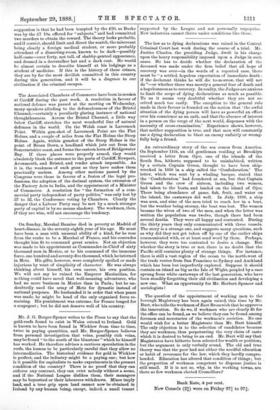The law as to dying declarations was raised in the
Central Criminal Court last week during the coarse of a trial. Mr. Justice Charles, the presiding Judge, dwelt in his charge upon the heavy responsibility imposed upon a Judge in such cases. He has to decide whether the declaration of the deceased was made under the firm belief that all hope of recovery was over—in the words of a reported case, there must be " a settled, hopeless expectation of immediate death : if the declarant thinks he will die to-morrow, that will not do "—or whether there was merely a general fear of death and a hopelessness as to recovery. In reality, the Judges are anxious to limit the scope of dying declarations as much as possible. To us it seems very doubtful whether they are not re- ceived much too easily. The exception to the general role made in their favour is founded on the notion that the awful situation of the dying person will have as powerful an effect over his conscience as an oath, and that the absence of interest in a person on the verge of the next world, dispenses with the necessity of cross-examination: Experience shows, however, that neither supposition is true, and that men will constantly use a. dying declaration to blast an enemy unfairly or wrong- fully help a. friend.






































 Previous page
Previous page